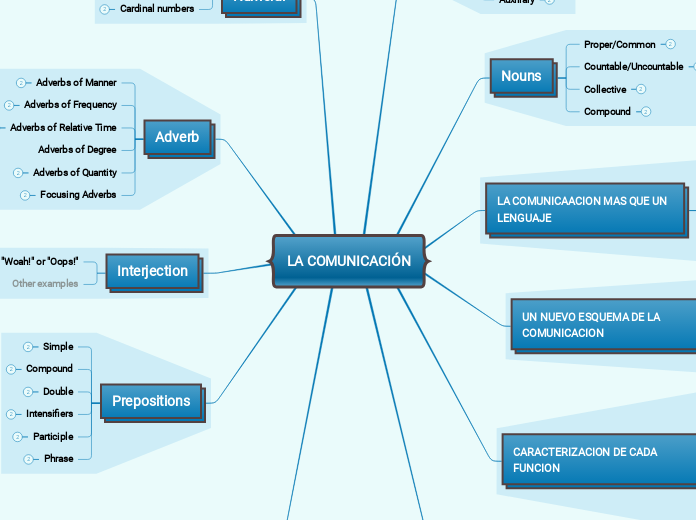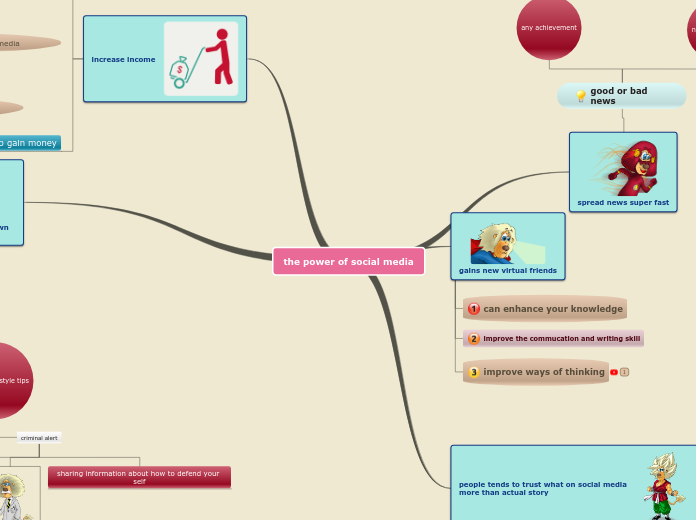LA COMUNICACIÓN
The part of speech is a category to which a word is assigned according to its syntactic functions. In English the main parts of speech are noun, pronoun, adjective, determiner, verb, adverb, preposition, conjunction, and interjection.
IMPLICACIONES PEDAGOGICAS
A conjunction is a word like 'if' 'but' or 'and' which is used to connect sentences or clauses together.
Acto de comunicación oral
Subordinating conjunctions are conjunctions that are used at the beginning of subordinate clauses. Some examples of these conjunctions are: although, after, before, because, how, if, once, since, so that, until, unless, when etc.
Although it was raining, I went out.
Acto de comunicación escrita
Coordinating conjunctions always connect phrases, words, and clauses. They are: for, and, nor, but, or, yet, so.
This stew is savory and delicious.
Prepositions
A preposition is one of the most exciting parts of grammar. A preposition is used to describe the location of something in relation to something else.
Phrase
A group of words used with the force of a single preposition is called phrase preposition.
according to, by means of, owing to, with a view to, in place of, in front of, etc.
Participle preposition consists of words that end in “ing”.
regarding, barring, concerning, considering, etc.
Intensifiers
Extremely, Very
Double
When a preposition consists of more than one word, it is called double preposition.
into, within, upto etc.
Compound preposition consists of two or more words.
on behalf of, according to, in front of, from across, etc.
Simple
When a preposition consists of one word it is called single or simple preposition.
in, at, on, to for, of, from, up, after, over, under, with, etc.
Interjection
An interjection is used to express emotion in a sentence.
Think of other interjections!
Other examples
"Woah!" or "Oops!"
Adverb
An adverb is used to describe a verb, but it can also describe an adjective or another adverb.
Adverbs normally help paint a fuller picture by describing how something happens.
Focusing Adverbs
Especially, Specifically, Merely, Either
Adverbs of Quantity
A lot, Little, Much
Adverbs of Degree
The intensifiers strengthen adverbs adjectives and adverbs and down- toners make them weaker.
Adverbs of Relative Time
Just, Afterward, Soon, Currently
Adverbs of Frequency
Always, usually, Never
Adverbs of Manner
Carefully, Slowly
Numeral
A numeral is a word or phrase that describes a numerical quantity.
Some theories of grammar use the word 'numeral' to refer to cardinal numbers that act as a determiner to specify the quantity of a noun, for example the 'two' in 'two hats'.
Cardinal numbers
One, two..
Ordinal numbers
First, second..
FUNCIONES DEL LENGUAJE SEGUN HALLIDAY
Función textual
Función interpersonal
Función ideacional
CARACTERIZACION DE CADA FUNCION
An article is a word used to modify a noun, which is a person, place, object, or idea. Technically, an article is an adjective, which is any word that modifies a noun.
Funcion emotiva
Funcion linguística
Funcion fatica
Funcion poetica
Funcion conativa
Funcion referencial
It refers directly to a specific noun or groups of nouns.
The breakfast on my plate.
UN NUEVO ESQUEMA DE LA COMUNICACION
A pronoun is a word that can be used in place of a noun, typically after the noun itself has already been stated.
LA COMUNICAACION MAS QUE UN LENGUAJE
An adjective is a word that's used to describe a specific noun and to provide more detail to the listener.
Código cultural
Additional info
Comunicación no verbal
Superlative adjectives demonstrate a higher level of comparison between entities.
She is the prettiest princess.
Comportamientos sociales
Expresses a comparison between two entities or groups of entities in quality or degree.
Espacio interindividual
El gesto y la mirada
Nouns
A noun is defined as a person, place, thing or idea. Proper nouns always begin with a capital letter. Common nouns, which are general words, such as 'cars,' are not capitalized.
Compound
Compound nouns are words where two nouns have been stuck together to make a new noun. Compound nouns should be written as one word, without a hyphen.
Candlestick
Collective
A noun which refers to a group of things/people.
Family, Class
Countable/Uncountable
Countable nouns are nouns that can be counted, even if the number might be extraordinarily high.
Uncountable nouns are nouns that come in a state or quantity which is impossible to count; liquids are uncountable, as are things which act
like liquids.
Cats, Rain
Proper/Common
Proper nouns are the names of specific people or places. They should always begin with a capital letter.
Mary, Paris
Verb
A verb is an action word or 'doing' word that signifies movement in some way.
Auxiliary
An auxiliary verb helps the main (full) verb and is also called a 'helping verb.' With auxiliary verbs, you can write sentences in different tenses, moods, or voices.
You have been practicing hard.
Participle
A participle is a verb form that can be used as an adjective or to create a verb tense. There are two types of participles: Present participle (ending -ing) and Past participle (usually ending -ed, -d, -t, -en, or -n).
The winning athlete gets a trophy.
Modal
A modal is a type of auxiliary (helping) verb that is used to express: ability, possibility, permission or obligation. The main modal verbs in the English language are: can, could, may, might, must, shall, should, will, would.
I might go to the park if I get my homework done.
Linking verb
A linking verb connects the subject with a word that gives information about the subject, such as a condition or relationship.
You look exhausted after studying all night.
Full verb
A verb with its own meaning: a verb that is not an auxiliary verb.
Create sentences
They have it.









